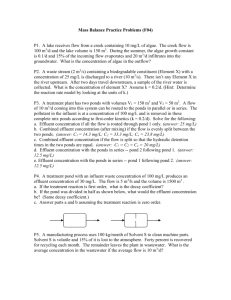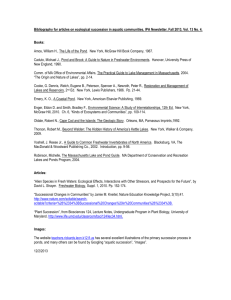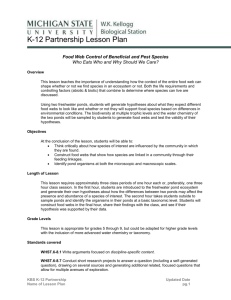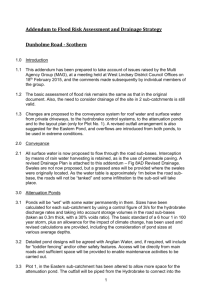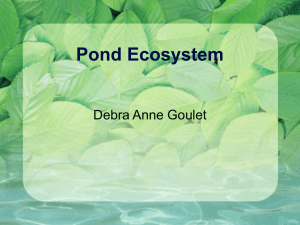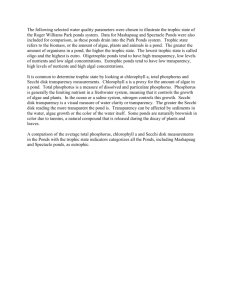doc - Freshwater Habitats Trust
advertisement
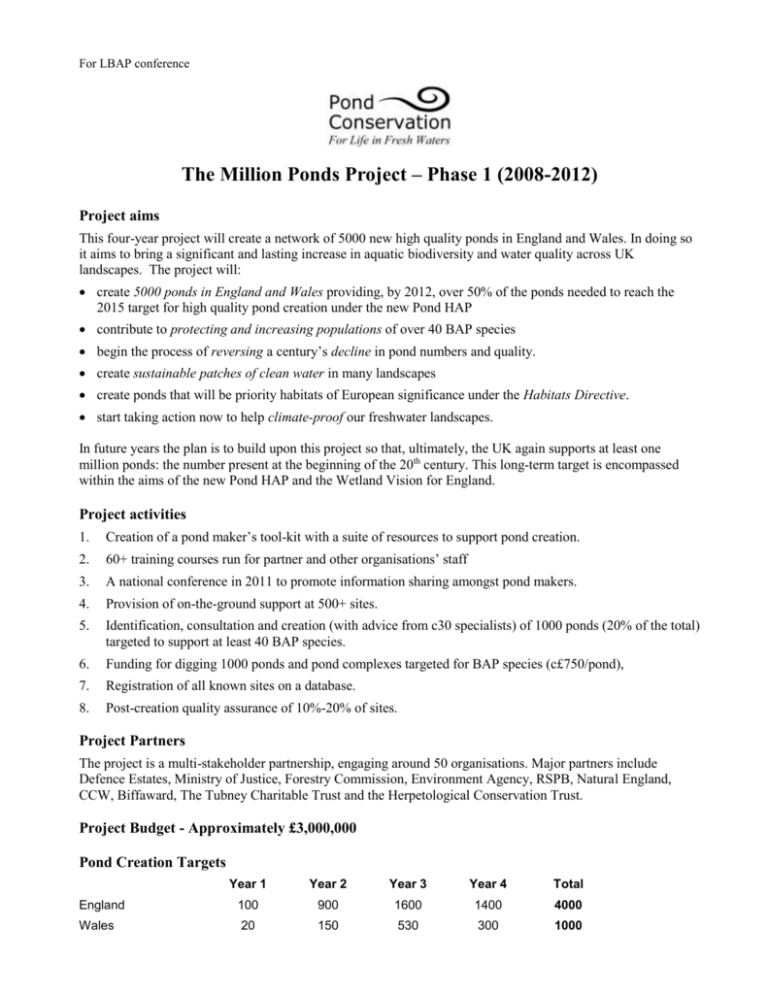
For LBAP conference The Million Ponds Project – Phase 1 (2008-2012) Project aims This four-year project will create a network of 5000 new high quality ponds in England and Wales. In doing so it aims to bring a significant and lasting increase in aquatic biodiversity and water quality across UK landscapes. The project will: create 5000 ponds in England and Wales providing, by 2012, over 50% of the ponds needed to reach the 2015 target for high quality pond creation under the new Pond HAP contribute to protecting and increasing populations of over 40 BAP species begin the process of reversing a century’s decline in pond numbers and quality. create sustainable patches of clean water in many landscapes create ponds that will be priority habitats of European significance under the Habitats Directive. start taking action now to help climate-proof our freshwater landscapes. In future years the plan is to build upon this project so that, ultimately, the UK again supports at least one million ponds: the number present at the beginning of the 20th century. This long-term target is encompassed within the aims of the new Pond HAP and the Wetland Vision for England. Project activities 1. Creation of a pond maker’s tool-kit with a suite of resources to support pond creation. 2. 60+ training courses run for partner and other organisations’ staff 3. A national conference in 2011 to promote information sharing amongst pond makers. 4. Provision of on-the-ground support at 500+ sites. 5. Identification, consultation and creation (with advice from c30 specialists) of 1000 ponds (20% of the total) targeted to support at least 40 BAP species. 6. Funding for digging 1000 ponds and pond complexes targeted for BAP species (c£750/pond), 7. Registration of all known sites on a database. 8. Post-creation quality assurance of 10%-20% of sites. Project Partners The project is a multi-stakeholder partnership, engaging around 50 organisations. Major partners include Defence Estates, Ministry of Justice, Forestry Commission, Environment Agency, RSPB, Natural England, CCW, Biffaward, The Tubney Charitable Trust and the Herpetological Conservation Trust. Project Budget - Approximately £3,000,000 Pond Creation Targets Year 1 Year 2 Year 3 Year 4 Total England 100 900 1600 1400 4000 Wales 20 150 530 300 1000 Why we need this project Water pollution is now pervasive in all waterbody types: with almost all lowland streams and rivers, and 80% of ponds, now degraded. Even in the uplands pollution is widespread. Isolation is also a critical factor: over the last century about 70% of all rivers in Britain have been channelised, allowing extensive drainage of floodplain wetlands; the numbers of ponds in England and Wales have declined by over 50%. Together, these impacts pose major threats to our freshwater wildlife, and there are significant concerns that, without action on-theground, species and communities will continue to decline irrevocably. It is very hard to significantly improve stream, river, ditch or lake quality. To do so, enormous investments in time and capital are needed: in improving sewage works and controlling septic-tank discharges, in treating road run-off, and in changing farming practices across whole catchments. Given the scale of these problems, the level of investment needed and uncertainties about the effectiveness of many of these practises, it is unlikely that widespread and significant improvements in water quality will occur in these waterbodies in the near future. This is not true of ponds. Ponds have small catchment areas and because of this it is possible to instantly create new clean ponds with semi-natural catchments in all parts of Britain, even in intensively managed agricultural landscapes. We have shown that these new ponds can provide clean-water habitats, which rapidly colonise with plants and animals, including uncommon species, now threatened in other freshwaters. Since ponds support many species that also make use of streams and rivers, by creating this new freshwater resource we add to the freshwater biodiversity resource of the landscape as a whole. How the project will work The Million Ponds project aims to create many thousands of new high quality ponds across the UK, with the focus on creating two types of pond: (i) 4000 ponds will be HAP ‘high quality potential’ ponds, which will provide new clean water habitats across the countryside. These ponds will be created in clean unpolluted catchments, mainly by working with major landowners and managers who have agreed to create significant numbers of ponds as part of their land management programmes. The project will work with these landowners, and others, providing training, advice and on-the-ground support for pond creation (ii) 1000 ponds will be specifically designed and targeted to support 40-50 BAP species. To ensure these ponds have the best design and location, the project will work with species experts to provide advice and a pond-digging fund. LBAP involvement in Million Ponds project: The Million Ponds project can support LBAP pond creation targets over the next 4 years by providing training to landowners, managers and others with the opportunity and resources to make high quality ponds across England and Wales. With larger schemes (e.g. complexes with more than 10 ponds) our advisors can provide on-site advice. In the first year, the project will create an extensive tool-kit, available to all pond-makers on line at www.pondconservation.org.uk. This will provide step-by-step advice through all stages of high-quality creation from planning to aftercare. Over 50 BAP species use ponds. For a provisional list see www.pondconservation.org.uk/ourwork/conservation/millionpondsproject From 2009, the Million Ponds project can provide grants and advice of £750 per pond, for pond creation for these species. If you would like to be involved in the Million Ponds Project, please contact the project co-ordinator Pascale Nicolet pnicolet@pondconservation.org.uk or 01865 483694.

